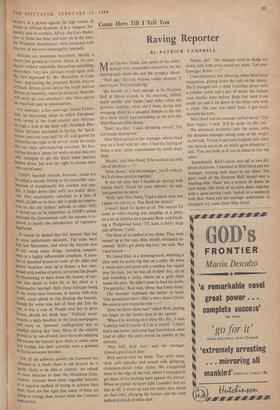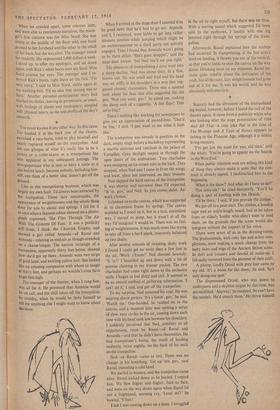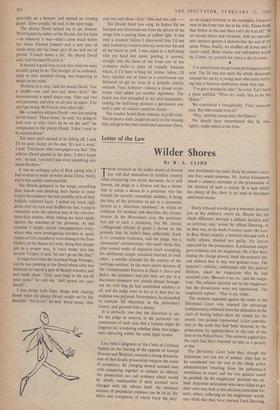Come Here Till I Tell You
Raving Reporter
By PATRICK CAMPBELL
MISS GLORIA NORD, tiny jewel of the roller- skating rink, suspended rumination on her chewing-gum when she saw the prospect ahead.
'Well, gee,' she said, without visible pleasure, 'I don't know. You're kinda big.'
She herself, in a back passage in the Empress Hall at eleven o'clock in the morning, looked much smaller and frailer—and older—than the previous evening, when she'd been diving and swooping about in a spangled Stetson as the star of a show which had something to do with the Wild West on roller-skates.
'Don't say that,' I said, shrinking myself. 'I'm just handy skating size.'
Miss Nord turned to her manager, whose head was on a level with her own. I had the feeling of being a tree, under examination by small, wary dogs.
'Maybe,' said Miss Nord, `if he worked out with one of the boys—?'
'Now, honey,' said the manager, 'you'll make it. We'll all three pitch in together.'
It was his idea that I should go skating with Gloria Nord. 'Good for your column,' he said, 'and good for the show.'
'Well,' said Miss Nord, 'I got a lunch date, but I guess we can try it. You fixed for skates?'
I wasn't fixed for skates at all. The nearest I'd come to roller-skating was standing, at a party, on a lot of marbles on a parquet floor, and break- ing a Wedgwood bowl. want a fairly large pair of boots,' I said.
The three of us looked at my shoes. They were turned up at the toes. Miss Nord's resistance in- creased. 'Rick's got pretty big feet,' she said. `But I don't know--' We found Rick in a dressing-room, whittling a stick with his pretty big feet on a table. He wore a sweat-shirt and jeans and a cowboy hat tipped over his eyes, but he was all in-door boy, up to and including a lucky charm on a gold chain round his neck. He didn't want to lend his boots. `I'm partikler,' Rick said, 'about that kinda thing.'
The manager explained the matter in hand. `This gennelman here's filin' a story about Gloria.
He wants a turn round the rink 'Does he havta skate too?' asked Rick, putting his finger on the luxury item in the agenda.
'When I'm working on a piece like this,' I said, 'I always feel it's better if I do it myself.' I didn't feel it was better, and never had, but without some kind of effort the story would be slender in the extreme.
'Play ball, Rick boy,' said the manager. 'Gloria's got a lunch date.'
Rick parted with his boots. They were white, thick with pipeclay and armed with glittering, chromium-plated roller skates. We transported them to the edge of the rink, where I managed to get them on by pushing hard against the barrier. When we pulled the laces tight I couldn't feel my feet at all. I stood up and the boots shot about on their own, charging the barrier and the seats behind in clouds of white dust. `Steady, pal!' The manager tried to damp me down, with both arms round my waist. 'Let your knees go! Relax !'
I was stationary, but vibrating, when Miss Nord reappeared, gliding down the aisle on her skates. She'd changed into a thick Canadian jersey with a reindeer motif, and a pair of slacks. She looked even smaller than before. Both feet went from under me and I sat down in the front row with a crash. The seat was tilted back. I got stuck between the arms.
Miss Nord and the manager pulled me up. 'The floor slopes,' I said. 'It'll be easier on the rink.'
We advanced hesitantly into the arena, with the skateless manager taking most of the weight on his side. Trying to get some laughter into what was turning out to be an overly grim enterprise, I said, 'You two look as if you're about to toss the caber.'
Immediately, Rick's boots shot off in two dif- ferent directions. I snatched at Miss Nord and her manager, burying their faces in my chest. The great vault of the Empress Hall turned into a whirling blur. There was a screech of skates on bare wood. The three of us came down together with a spine-jarring crash, locked in a sandwich with Miss Nord and her manager underneath. A strangled cry came from Miss Nord. When we crawled apart, some minutes later, and were able to reorientatc ourselves, the mana- gers first concern was for Miss Nord. She was sitting in the middle of the floor with one hand pressed to her forehead and the other in the small of her back, but she was alive. The manager raised her tenderly. She represented 3,000 dollars a week.
stood up, to offer my apologies, and sat down again, with Rick's white boots over my head. Miss Nord averted her eyes. The manager and I re- moved Rick's boots, right there on the rink. 'I'm very sorry,' I said to Miss Nord, stable again in my stocking-feet, 'I'd no idea that skating was so hard.' Another personal-participation story had reached its clinlax, leaving its perpetrator, as usual, with feelings of shame and inadequacy, coupled with physical injury, as the sole profits of the day's research.
, I've never known it any other way. In this cause I ve hoofed it in the back row of the chorus, exercised a race-horse, tried to play baseball and nearly ruptured myself on the trampoline. And not one glimpse of what it's really like to be a Jockey or a roller-skater or a trampolinist has ever appeared in my subsequent jottings. The newspaperman who is sent to have a rattle at it Just before lunch, because nobody, including him- self, can think of a better idea, doesn't get off the ground.
Like in this trampolining business, which was largely my own fault. I'd always been attracted by the trampoline. Those lazy somersaults, the appearance of weightlessness and the whole thing done for you by elastic and springs. I fell for it at once when a features editor showed me a photo- graph captioned, 'She Flies Through The Air With The Greatest Of Ease.' It was a publicity Still from, I think, the Chiswick Empire, and showed a girl called Amanda—of Raoul and Amanda—relaxing in mid-air as though stretched on a chaise-longue. The narrow rectangle of a trampoline, apparently thirty feet below, showed how she'd got up there. Amanda wore two strips of gold lame, and swirling yellow hair. She looked like an amusing companion with whom to tangle at thirty feet, and perhaps we wouldn't even have to get that high.
The 'manager of the theatre, when I rang him, Was all for it. He promised that Amanda would be on call, and the chill taken off the trampoline, by midday, when he would be there himself to tell me anything else I might want to know about the show. When I arrived at the stage door I counted it to be good news that he'd had to go out. Amanda and I, I reckoned, were liable to get into rather intimate jumbles while jumping which might be an embarrassment to a third party not actively engaged. Then I found that Amanda wasn't going to be there either. `She's gorn shoppin',' said the stage-door keeper, 'but Ned 'ere'll see you right.'
The pleasures of trampolining a deux went into a sharp decline. Ned was about sixty, in a thin, brown suit. He was small and frail and his head was set stiffly in his shoulders in a way that sug- gested chronic rheumatics. There was a seamed look about his face that also suggested the old pro. 'Wot you want, guy?' he asked me, sucking the damp stub of a cigarette. 'A few flips? That sorta fing?'
There's nothing like working for newspapers to give one an appreciation of second-best. 'That'd be fine,' I said. 'I just want to see what it feels like.'
The trampoline was already in position on the dark, empty stage before a backdrop representing a marble staircase and vestibule in the palace of Versailles. Grey daylight seeped in through the open doors of the auditorium. Two charladics were sweeping up ice-cream tubs at the back. They stopped, when Ned and I came in from the wings, and leant, silent but interested, on their brooms.
Ned slapped the hard canvas of the trampoline. It was shorter and' narrower than I'd expected. "It 'er, guy,' said Ned, 'as you comes dahn. An' work y'knees.'
I climbed on to the canvas, which was supported in its chromium frame by springs. The canvas wobbled as I stood on it, but in a taut, unresilient way. I started to jump, but it wasn't at all the way I'd imagined it would be. There was no feel- ing of weightlessness. It was much more like trying to take off from a hard plank, insecurely balanced on two chairs.
After several minutes of sweating, dusty work I found I could get no more than a few feet in the air. 'Work y'knees!' Ned shouted hoarsely. "It 'er !' I bounded up and down with a lot of pennies clashing in my trouser pocket. The two charladies had come right down to the orchestra stalls. I began to feel dizzy and sick. It seemed to be an absurd method of gathering information. 'I 'can't do it,' I said, and got off the trampoline.
To my surprise, Ned removed his coat. He was wearing sleeve garters. 'It's y'timin', guy,' he said. 'Watch me.' One-handed, he vaulted on to the canvas, and a moment later was turning a series of slow, easy circles in the air, coming down each time with his head sunk low between his shoulders. I suddenly perceived that Ned, contrary to all expectations, must be Raoul—of Raoul and Amanda—and that he didn't have rheumatics. He had trainpoliner's hump, the result of landing endlessly, twice nightly, on the back of his neck on the trampoline.
Ned—or Raoul—came to rest. There was no change in his breathing. `Git up 'ere, guy,' said Raoul, extending a cold hand.
We started to bounce, and the trampoline came alive. Raoul kicked down as he landed. I copied him. We flew higher and higher, face to face, and were on the way down again when Raoul let out a frightened, warning cry, 'Level orf !' he bawled. 'Y'feet ! '
1 felt I was coming down on a slant. I struggled in the air to right myself, but there was no time. With a tearing sound which suggested I'd been split to the eyebrows, I landed with one leg jammed right through the springs of the tram- poline.
Afterwards, Raoul explained how the mishap had occurred. In trampolining, if the feet aren't level on landing, it throws you out of the vertical, so that you're liable to miss the canvas on the way down. Drinking stout on my expenses, Raoul be- came quite voluble about the intricacies of his craft, but all the easy, lazy weightlessness had gone out of it for me. It was his world, and he was absolutely welcome to it.
Scarcely had the abrasions of the trampolined leg healed, however, before I heard the call of the theatre again. It came from a publicity whizz who was looking after the stage presentation of 1066 And All That—a cosy joke that in the time of The Hostage and A Taste of Honey appears to belong to the Pliocene Age, although it is within living memory.
'I've got just the stunt for you, old man,' said the whizz. 'You're going to appear on the boards in the West End.'
When public relations men are selling this kind of thing they always make it seem that the con- tract is already signed. I backtracked him to the beginning.
'What is the show? And what do I have to do?' 'Ten sixty-six he cried buoyantly. 'You'll be doing a spot of hoofing with the Druids.'
'I'll be there,' I said, 'if you provide the clothes.'
We got off to a poor start. The clothes, a hooded cape and an ankle-length beard, had to be taken from an elderly hoofer who didn't want to lend them, on the grounds that the scene would dis- integrate without the support of his voice.
There were seven of us in the dressing-room. The professionals, with ruby lips and ochre com- plexions, were making a quick change from the hairy skins and wigs of the Ancient Briton scene. In shirt and trousers and devoid of make-up, I felt sadly removed from the glamour of their craft.
A plump, kindly Druid with grey hair came to my aid. It's a boost for the show,' he said, 'he's only doing one spot.'
The dispossessed Druid, who was down to underpants and a skyblue singlet by this time, was not mollified. 'Anyway,' he snapped, 'he can't have the sandals. He'd stretch them.' He threw himself
peevishly on a hamper and opened an evening paper. 'Some people,' he said, to the open page.
The plump Druid helped me to get dressed. We'd looted the tallest of the Druids, but his habit —or whatever it was—didn't come much below my knees. Flannel trousers and a new pair of suede shoes put the lower part of me well out of period. 'Crouch down a bit,' the plump Druid said, 'and the beard'll cover it.' It seemed a good time to ask him what we were actually going to do. The thought of an audience, eight or nine hundred strong, was beginning to weigh on my mind.
'Nothing to it, boy,' said the plump Druid. 'Just a shuffle—one and two and three—kick!' He demonstrated a small dance-step. 'One and two and pirouette, and then we all join up again. You can't go wrong. He'll be on your other side.'
He—a notably willowy Druid—was just putting on his beard. 'Those shoes,' he said, 'are going to look ever so silly. Can't he be on the end?' he complained to the plump Druid. 'I don't want to be messed about.'
The team spirit seemed to be falling off. I said I'd be quite happy on the end. 'It's just a stunt,' I said. 'You know what newspapers are like.' The willowy Druid paused at the door. 'I don't know why,' he said, 'you don't just write something nice about the show.'
It was an unhappy echo of Rick asking why I had to skate in order to write about Gloria Nord; and it was equally unanswerable.
The Druids gathered in the wings, smoothing their beards and pinching their hoods in order to give the audience the best possible view of their brightly coloured faces. I pulled my hood right down over my eyes and shuffled my feet, trying to remember even the opening step of the one-two- three-kick routine, while closing my mind rigidly against the outcome of the pirouette. At that moment I deeply envied newspapermen every- where who were investigating murders or quad- ruplets or City swindles or even dozing in the Press Gallery of the House of Lords, doing their proper job in a proper way. A voice broke into this reverie. 'Cripes,' it said, 'he can't go on like that!'
It might have been the Assistant Stage Manager, and he was pointing at the Druid whose robe was balanced on top of a pair of flannel trousers, and new suede shoes. 'Tuck your bags in the top of your socks!' he told me. 'And spread out your beard!'
I was doing both these things with shaking hands when the plump Druid caught me by the shoulder. 'We're on !' he said. 'Keep steady. One and two and three—kick! One and two and—' The Druids burst into song. In Indian file we bumped and shimmied out from the gloom of the wings into a searing blaze of yellow light. It was only a moment before 1 discovered that I'd not only tucked My trousers into my socks but the end of the beard as well. 1 was roped in a half-hoop with my head low down peering, it seemed, straight into the faces of the front row of the orchestra stalls—a piece of comedy business which, if I'd been writing for Arthur Askey, I'd have rejected out of hand as a contrivance too laboured td get by even at a juvenile charity matinee. Fate, however—always a broad script- writer—had added yet another ingredient. The beard was also entangled in my sock-suspenders, making the half-hoop position a permanent one until a pair of scissors could be found.
The number lasted three minutes, or a life time. The orchestra stalls caught on early to the missing link, and gave him their undivided attention. Once, as we surged forward to the footlights, 1 heard a man in the front row say to his wife, 'Great Scott, that fellow at the end there can't do it at all!' As we turned about and retreated, with an unavoid- ably derisive gesture I showed him the end of mY spine. When, finally, we shuffled off it was only a minor relief. Bitter shame and self-hatred would be, I knew, my portion for many a day to come.
I've retired from the personal participation story now. The lid was put upon the whole disastrous concept for me by a young man who came hurry- ing into a features conference some time ago.
Tye got a wonderful idea!' he cried. 'Let's have a piece entitled, "What it's really like to be the Queen!"' We considered it thoughtfully. 'Fine,' someone said.. 'But who would write it?'
'Why,' said the young man, 'the Queen !'
We should have remembered that he was, rightly, under notice at the time.








































 Previous page
Previous page